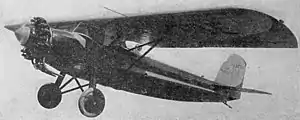Moreland M-1
The Moreland M-1 was a 1929 U.S. three seat civil aircraft. Only four were built.
| Moreland M-1 | |
|---|---|
 | |
| Role | Three seat light sports and transport biplane |
| National origin | U.S. |
| Manufacturer | Moreland Aircraft Inc. |
| Designer | G.E.Moreland and Orrin Moe |
| Number built | Four |
Design and development
The M-1 was the first aircraft built by Moreland aircraft, founded in 1928 and based at El Segundo, California. Led by G.E.Moreland and Orrin Moe,[1] the design also contained Ed Heinemann's first contributions.[2] It was a parasol wing aircraft with wings of rectangular plan apart from rounded tips and a central, trailing edge cut-out to enhance the pilot's field of view. They had wooden structures with spruce box-spars and ribs, were plywood-covered and braced to the fuselage by pairs of outward-leaning N-form struts between the mid- and lower longerons and the wing spars. These struts were quite short, reaching the wings at about 25% span. A cabane provided central wing support.[3]
The M-1's nine cylinder Wright J-5 Whirlwind radial engine was nose-mounted, flown with or without a ring type engine cowling. The fuselage of the M-1 had a welded chrome-molybdenum steel tube structure, like many designs of the time, and was fabric-covered. Zips provided easy access to the rear control connections. Two passengers sat side-by-side close to the wing underside at about mid-chord. They were protected by a large, V-shaped windscreen which projected forward of the leading edge to the engine mounting and rearwards to the hinge of a large access door. The pilot's well-instrumented cockpit was under the trailing edge cut-out, providing views both above and below the wing.[3]
The M-1's vertical rear control surfaces were rather straight and upright, though the balanced rudder was round-tipped. Its tailplane, mounted on top of the fuselage, was adjustable and wire-braced to the fin.[3]
The undercarriage was a split axle design, with the axles hinged from the fuselage central underside. Near-vertical Aerol shock absorber legs were fuselage-mounted at the base of the forward wing struts and drag struts reached rearwards to the lower fuselage.[3]
Operational history
The M-1 first flew in 1929, though the exact date is not known,[1] and received its type certificate in September.[4] It featured at the Cleveland Air Show held in the autumn of 1929.[5] Only four were built.[1]
Specifications
Data from Aero Digest (September 1929)[3] except where noted
General characteristics
- Crew: one
- Capacity: two passengers
- Length: 26 ft 6 in (8.08 m)
- Wingspan: 39 ft (12 m)
- Height: 8 ft 9 in (2.67 m)
- Wing area: 260 sq ft (24 m2) including ailerons
- Empty weight: 1,750 lb (794 kg)
- Gross weight: 2,750 lb (1,247 kg)
- Fuel capacity: 70 US gal (58 imp gal; 260 l)
- Powerplant: 1 × Wright J-5 Whirlwind nine cylinder radial, 225 hp (168 kW) at 1,800 rpm
- Propellers: 2-bladed [1]
Performance
- Maximum speed: 132 mph (212 km/h, 115 kn)
- Cruise speed: 115 mph (185 km/h, 100 kn)
- Landing speed: 40 mph (64 km/h; 35 kn)
- Range: 650 mi (1,050 km, 560 nmi)
- Service ceiling: 17,800 ft (5,400 m) ; absolute ceiling 20,000 ft (6,100 m)
- Rate of climb: 1,000 ft/min (5.1 m/s) initial
References
| Wikimedia Commons has media related to Moreland M-1. |
- "Aerofiles: Moreland". Retrieved 20 May 2020.
- Gunston, Bill (1993). World Encyclopaedia of Aircraft Manufacturers: from the pioneers to the present day. Sparkford, Somerset: Patrick Stephens Limited. p. 211. ISBN 9 781852 602055.
- Horsefall, J.E., ed. (August 1929). "Moreland Monoplane". Aero Digest. Vol. 15 no. 2. New York City: Aeronautical Digest Publishing Corp. p. 146.
- Horsefall, J.E., ed. (September 1929). "Recent approved type certificates". Aero Digest. Vol. 15 no. 3. New York City: Aeronautical Digest Publishing Corp. p. 220.
- Horsefall, J.E., ed. (September 1929). "Exhibitors at the Cleveland Air Show". Aero Digest. Vol. 15 no. 3. New York City: Aeronautical Digest Publishing Corp. p. 118.